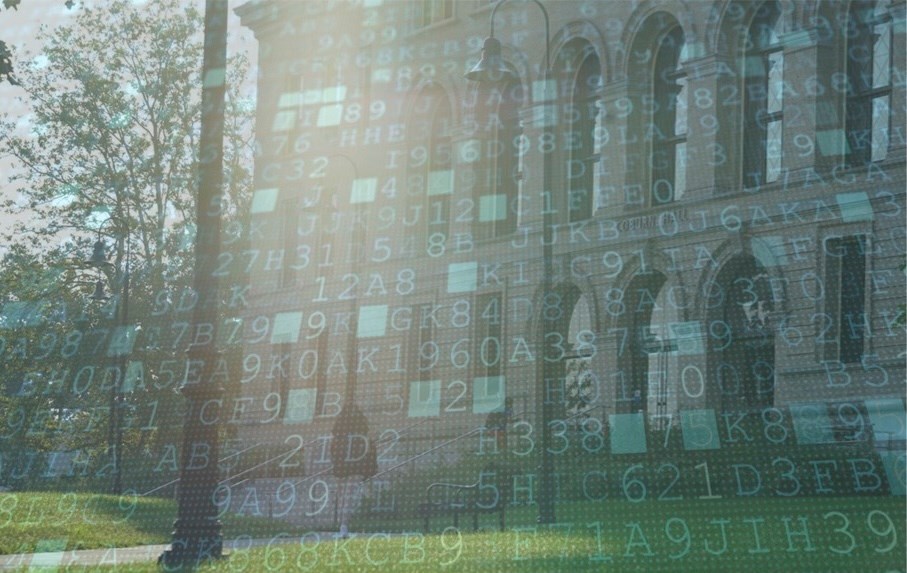Romy Guthier Helps Faculty Integrate Generative Artificial Intelligence into Their Courses
 Image by Brooke Coupal
Image by Brooke Coupal
Physics Asst. Prof. Romy Guthier is certified in teaching with artificial intelligence through Harvard Business Publishing Education.
08/22/2024
By Brooke Coupal
Artificial intelligence is making its mark on education.
According to a survey conducted by UMass Lowell’s AI task force, 65% of faculty use AI tools in their teaching and administrative tasks, while 45% of students are using AI, mainly for research and project management.
Industry experts project that AI will continue to rise in popularity, further transforming the education sector. To keep up with evolving AI technologies, the Provost’s Office recently appointed Physics Asst. Prof. Romy Guthier as the faculty fellow for AI integration in pedagogy.
“The creation of this position reflects our commitment to proactively address the opportunities and challenges presented by AI in education,” says Julie Nash, vice provost of academic affairs and a member of UMass Lowell’s AI task force, which, since the fall of 2023, has explored the implications of AI on the university’s academic programs and integrity.
Guthier is furthering the efforts of the task force by helping faculty to effectively integrate generative AI technologies into their teaching practices.
“Romy Guthier is the perfect candidate for this position due to her enthusiasm for integrating AI into pedagogy, even as she shares the concerns of many of our faculty members,” Nash says.
Guthier recently sat down to discuss her work and her thoughts on AI in education.
Q: Why is it important for professors to teach students about AI?
A: AI is everywhere, whether we like it or not. Because of that, we need to educate students on how to use it effectively and ethically.
Q: What concerns do you have about AI?
A: Both educators and students may become dependent on AI technologies. To overcome this, it is very important to value traditional teaching methods and to utilize AI as a supplement to teaching, rather than as a replacement. There is also the possibility of students using AI to cheat. As the faculty fellow for AI integration in pedagogy, I encourage all faculty to have a clear rule in their syllabus about how AI may be used in their class. This is even more important for those courses actively utilizing AI in teaching, which may raise questions by students about whether and to what extent AI can be used for certain assignments. I can help faculty find a syllabus statement that fits their expectations and needs.
Q: Do you use AI in your classroom?
A: I do. Last semester, in my course Introduction to Radiation Therapy Physics, I introduced the topic of generative AI and built exercises around that. For example, I had students use AI to look up policies on handling radioactive material, which change over time. AI did not pull up the current protocols, and students had to find the correct ones on their own. It was a reminder to be cautious with AI and not blindly trust the content it provides.
Q: How can you help other professors integrate AI into their courses?
A: I successfully completed the Teaching with AI: Practical Approaches to Using Generative AI in Class certificate offered by Harvard Business Publishing Education last spring, and I’m looking forward to sharing my insights. I learned about implementing generative AI in class activities and how to tailor that to different fields. For instance, using AI to analyze data in accounting will be very different than using it for creative thinking in the arts and humanities. I’ll be the go-to person to talk through professors’ AI-related ideas, whether it’s a new class activity they want to design or a specific question they have about its implementation, and provide them with resources (like the ones available on the Center for Excellence in Learning & Teaching website) to make it happen.
Q: As the faculty fellow for AI Integration in Pedagogy, you are mentoring faculty participants in the new AI Mini-Grant Program. Can you tell us more about this program?
A: The AI Mini-Grant Program encourages faculty members from all colleges to use AI in their teachings by providing them with workshops, resources and other training. My role in the program is to give guidance and be the contact person for the 30 participating faculty members. I want to encourage everyone to test AI out to see how it can enhance student learning experiences, prompt the responsible use of AI technologies in education and boost AI literacy.


